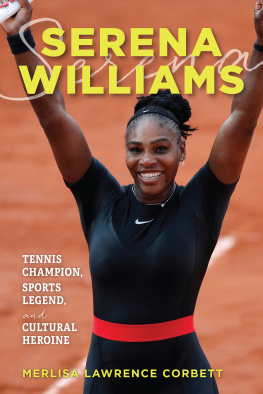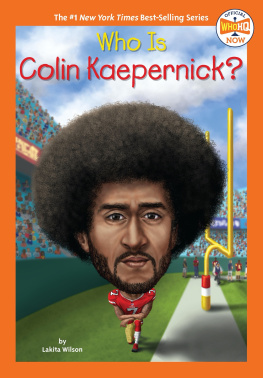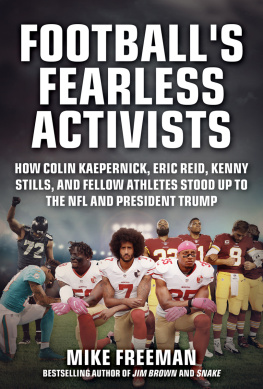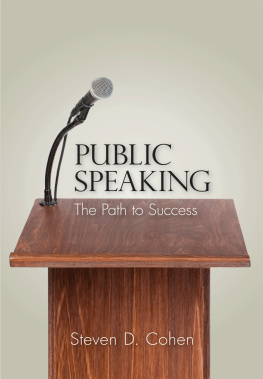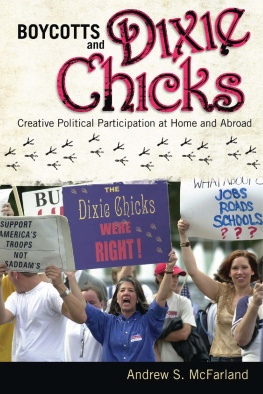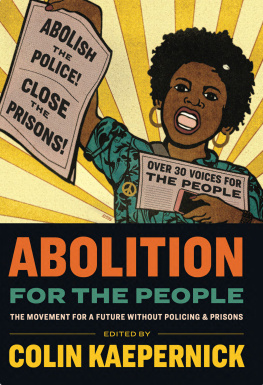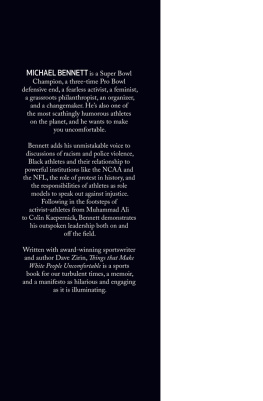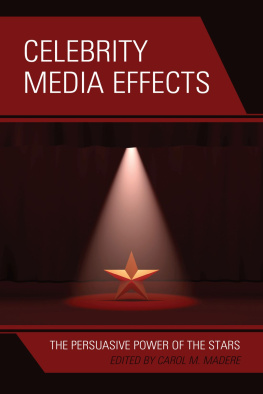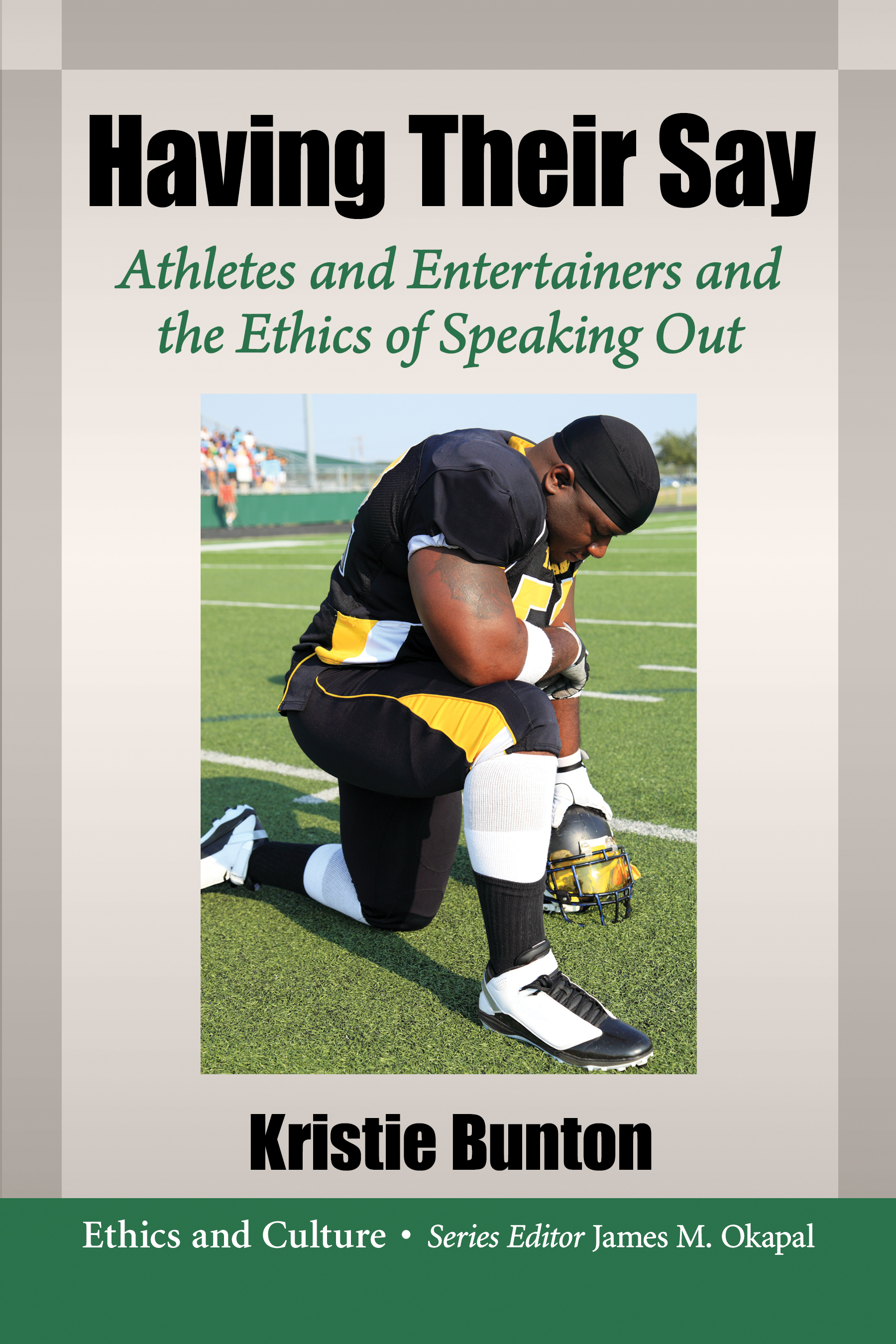Ethics and Culture
Ethics in Comedy: Essays on Crossing the Line (Steven A. Benko, editor, 2020)
Ethics After Poststructuralism: A Critical Reader (Lee Olsen, Brendan Johnston and Ann Keniston, editors, 2020)
Having Their Say: Athletes and Entertainers and the Ethics of Speaking Out (Kristie Bunton, 2021)
Having Their Say
Athletes and Entertainers and the Ethics of Speaking Out
Kristie Bunton
Ethics and Culture
Series Editor James M. Okapal

McFarland & Company, Inc., Publishers
Jefferson, North Carolina
This book has undergone peer review.
ISBN (print) 978-1-4766-8098-9
ISBN (ebook) 978-1-4766-4375-5
Library of Congress and British Library cataloguing data are available
Library of Congress Control Number 2021011554
2021 Kristie Bunton. All rights reserved
No part of this book may be reproduced or transmitted in any form or by any means, electronic or mechanical, including photocopying or recording, or by any information storage and retrieval system, without permission in writing from the publisher.
Front cover image of a pregame football player 2020 RobMattingley/iStock
Printed in the United States of America
McFarland & Company, Inc., Publishers
Box 611, Jefferson, North Carolina 28640
www.mcfarlandpub.com
Table of Contents
Preface
Over the years, I sometimes have explained my outspoken family and our spirited discussions by joking, We never met an opinion we couldnt have. Ive enjoyed our ability to be our own marketplace of competing ideas. Over those same years, in my many communication ethics classes, Ive also enjoyed encouraging students to recognize the power and promise of free expression of competing ideas to serve the common good. Yet as the rancorous 2018 midterm election season lurched to a close, I did not feel exhilarated by freewheeling expression conveyed through multiple channels. Instead, I felt exhausted by what seemed like the noise of opinion all around me in the news and commentary I ordinarily enjoyed reading and felt a duty to monitor. I wondered: Does everybody get to say something publicly these days? Do they all have to shoutor whatever is the equivalent of shouting on social mediaand disagree with one another? Why are news organizations reporting some of these ill-expressed ideas? Do I have to listen to them all? Should I respond to some?
As I looked ahead to what I imagined would be an even louder and more contentious 2020 presidential election season, I craved quiet to think about public noise, and I recalled an essay my colleague Dr. Wendy Wyatt and I wrote several years before. Our essay, The Ethics of Speaking Out, appeared in Ethics and Entertainment: Essays on Media Culture and Media Morality , published by McFarland and edited by Howard Good and Sandra L. Borden in 2010. Dr. Wyatt and I examined three episodes in the early 2000s when singers and actors shocked audiences by speaking out about political and social issues. Dr. Wyatt and I proposed a test that could be used to justify when celebrities ethically could transcend audiences role-related expectations for artistic or athletic performance to express serious views about public issues. I wondered how our speaking-out test might apply in the social media environment that had flourished since we published our essay in 2010.
I soon learned I wasnt alone in wondering. Serendipitously, McFarland editor Layla Milholen contacted Dr. Wyatt and me to ask whether our ideas about speaking out applied to the examples proliferating in todays fully digital environment. Dr. Wyatts other scholarly projects prohibited her from joining me to pursue a new examination of speaking out, but I decided to go ahead. I couldnt shake the conclusion that the noise of todays communication environment begged for an ethical analysis of when and how speaking out by famous people is justifiable. Digital platforms empower anyone with an internet connection to speak out publicly, nearly instantly to worldwide audiences, and in a way that persists over time. To me, this meant all of us as moral agentsbut especially those with the ability to command widespread public attentionshould think before speaking out about how our proposed speech might harm or help other stakeholders or issues.
As I approached anew the topic of speaking out, I collected more examples than I possibly could analyze, perhaps because mainstream news coverage so often amplified the voices of celebrities who spoke out through social media platforms. After all, when professional basketball superstar LeBron James tweets that U.S. President Donald Trump is a bum, it makes news. I quickly decided to use national news coverage of speaking out to help me winnow the many examples available to examine. I also began to focus more closely on superstar athletes and entertainers than on other public figures who speak out because I observed these athletes and entertainers ubiquity in popular culture and what seemed to me to be their increasing participation in political culture. As I worked on this project throughout 2019 and into the early months of 2020, I found more and more examples of these celebrity athletes and entertainers speaking out with compelling force about the political implications of such issues as health care, policing and criminal justice, and racial and gender discrimination.
I finished the first draft of this book in March 2020. Within mere weeks, a series of dramatic public crises unfolded, convincing me I must revise the manuscript to include new and even more compelling cases of speaking out. The partisan cleavages that had so characterized public discourse in the United States since the 2016 presidential campaign and had played out so rancorously in the 2018 midterm election had by spring and early summer 2020 become louder and louder, as a coronavirus pandemic swept around the world, infecting and killing scores of people. Authorities rapidly closed factories, schools, restaurants, stores, offices and sports arenas to try to stop the virus from spreading. The economy cratered, leaving millions of workers without jobs and prompting acts of speaking out that blamed employers and politicians, while the simple act of wearing a face mask to prevent viral transmission prompted still more contentious and politicized speaking out.
Each of these three crisesescalating political divisions, a pandemic of unprecedented impact and the resulting economic devastationproduced much speaking out that I wanted to analyze as I revised this project. But a fourth crisis generated even more important speaking out to analyze. That crisis began on May 25, 2020, in Minneapolis, Minnesota, when police officers arrested a Black citizen named George Floyd, who was accused of using a counterfeit $20 bill to buy cigarettes and soon was restrained face down on a street by the police. A white officer knelt on George Floyds neck for nearly nine minutes while he pleaded for help and lay dying. Horrific video of Floyds killing was recorded by witnesses who soon shared the video in a variety of media channels. The video became a viral sensation and helped prompt millions of people around the world to speak out using social media and to join demonstrations for racial justice and police reform. As were so many observers, I was awed by the moral courage of people who risked exposing themselves to the life-threatening coronavirus by leaving the self-isolation of their homes to demonstrate in ways these protestors believed were essential for escalating awareness of the corrosive, life-threatening virus of racism and injustice.


